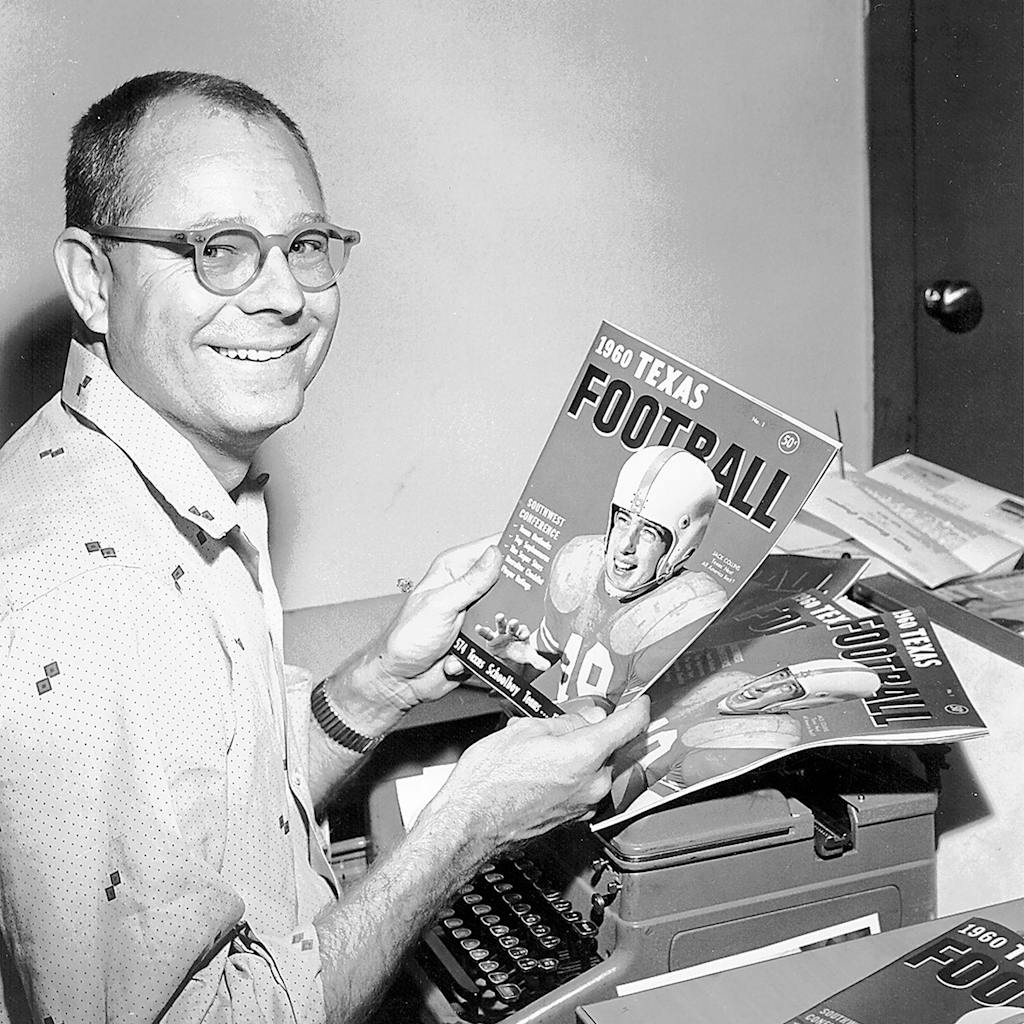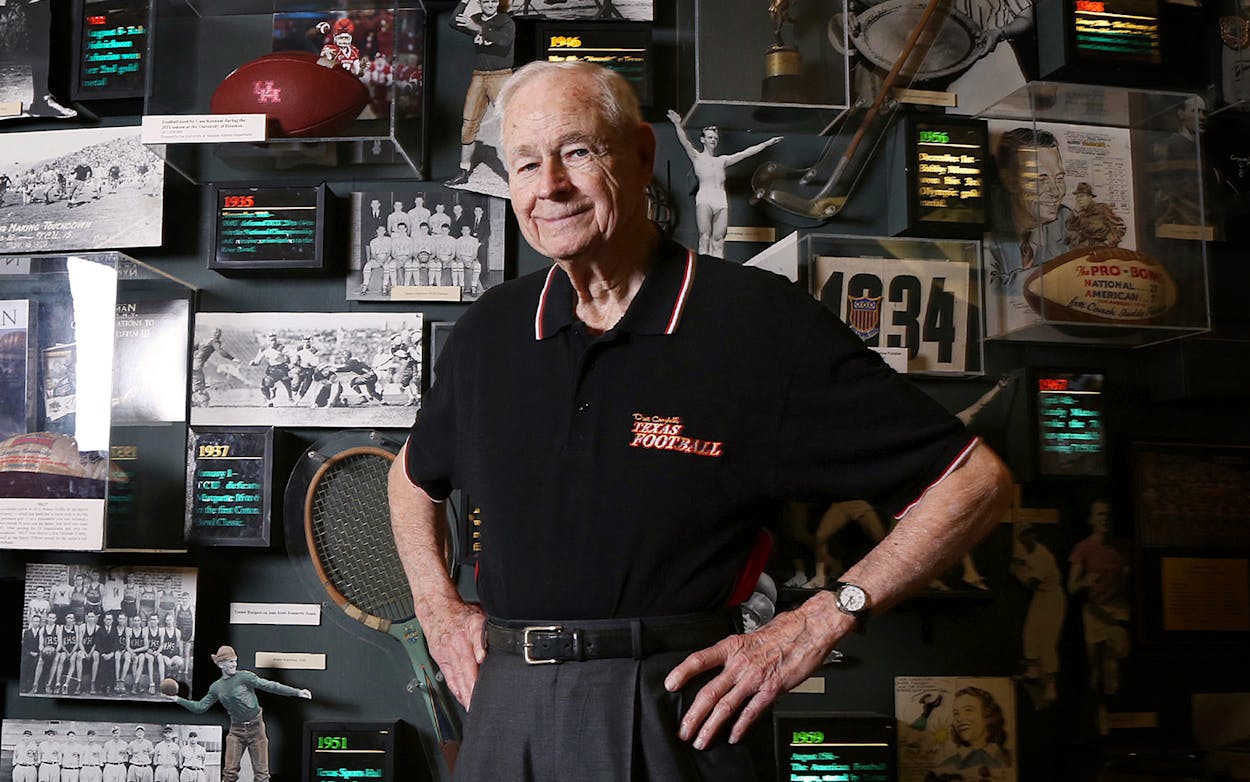Dave Campbell, who died at 96 years old last Friday, was a man of such humility and kindness that it’s easy for those of us of a certain age to overlook how important his Texas Football magazine was in transforming the very fabric of sports in our state.
Legends aren’t supposed to be so approachable and so genuine, and Campbell, with his warm, unassuming personality, had a way of making you feel so comfortable around him that you’d almost forget how influential he was. On autumn Saturday afternoons for more than seventy years, Dave would make his way through football stadium press boxes throughout the state (but especially in Waco, his hometown), greeting every sports writer and editor by name, praising their recent articles and making them feel that this little chat was the highlight of Dave‘s day.
Perhaps the highest compliment to Campbell’s heart and decency comes from the remembrances shared by the staff he oversaw at the Waco Tribune-Herald for 40 years and at Texas Football for 25, along with the coaches, administrators, and players at Baylor.
They loved and admired Campbell, and in the days since his death, they’ve struggled to find the right words to praise him. “He was my inspiration and role model,” wrote Houston Chronicle columnist John McClain, who worked with Campbell at the Tribune-Herald. “Hired me in 1973. I’ve never known a finer man. RIP, Mr. Campbell. You were the very best.”
Campbell was a brilliant editor who never lost his joy for the work of showing up at a game and, later on, pecking away at a keyboard to deliver the insight his readers had come to expect. “He made us feel like equals,” Jerry Hill wrote in the Tribune-Herald. “(He) was the best boss and mentor any of us could have ever asked for, and an even better friend.”
Houston Chronicle columnist Jerome Solomon tweeted: “When I introduced myself and Dave Campbell said, ‘I know who you are. You’re good,’ I was floored. Being asked to write articles for Texas Football will always be a career highlight.”
If Campbell asked a writer to contribute to Texas Football, that was a kind of affirmation that you might have a future in sportswriting. You knew it would be read and saved, that your parents would be impressed, and that your high school buddies would take note.
Campbell founded Texas Football in 1960 because he believed schools in the Lone Star State deserved better coverage than the national magazines back then offered. He believed the same sportswriters who covered Texas Tech, Baylor, and the rest of the state’s teams on a daily basis were the ones who could give the magazine a level of depth and knowledge that reporters outside Texas couldn’t match. He was convinced that such a publication would find its audience.
Campbell poured his heart, time, and money into the magazine. He generated most of the ideas for its contents and, for years, he edited virtually every word between its covers. Even after he sold Texas Football in 1985, Campbell remained involved until almost the end of his life.

“I have never known nor heard of anyone who had his command of the English language—and especially of sports verbiage,” said the late Hollis Biddle, who was Campbell’s right-hand man both at the Tribune-Herald and at Texas Football, according to Jerry Hill. “The first few years, he wrote every line of type in the high school section. And it was all accurate and interesting, and he did it so fast. I don’t know how he did it without repeating himself, but he did.”
Tony Pederson, who went on to serve as executive editor of the Houston Chronicle and who now teaches journalism at SMU, told Hill that his years working for Campbell were about “teaching us the fairness, integrity, and thoroughness that have marked his work. He writes with a style that cannot be taught or imitated.”
For everything that Campbell did to elevate college football coverage and to help make household names of coaches and players, his magazine had its greatest influence in the arena of Texas high school football. Before he founded Texas Football, the sport was seen through the narrow lens of Texans’ hometowns—plus maybe the next town over. Campbell believed fans wanted more. They might never study, follow, and argue about high school football the way they did the old Southwest Conference, but he was convinced they had a voracious appetite for more information about prep teams and talent.
It’s nearly impossible to overstate the influence Texas Football had in the sixties, seventies, and eighties. As fans, we’d anxiously check the mailbox for the new issue’s arrival. Or we’d sneak over to the supermarket to ask, “Any idea when you’ll be getting it?” Don Williams of the Lubbock Avalanche-Journal said one of the advantages of his family’s annual vacations in Central Texas was a chance to grab an early copy of Texas Football.
“As an 8-year-old in 1973 I marveled at seeing my big brother mentioned in the Kress Kangaroos’ writeup,” Williams wrote. “And at 56 in 2021, it was cool to see Texas Football pick my nephew . . . [as] preseason defensive player of the year in District 2-2A Division II.”
For decades, the magazine’s annual arrival, its selection of cover topics, its coverage of the Southwest Conference (and pretty much every other college program in the state), and its profiles of star players and coaches marked the unofficial beginning of every football season. It might be a stretch to draw a line from the enthusiasm captured in Texas Football to high school coaches pulling down six-figure salaries and school districts investing $60 million in stadiums, but Campbell’s magazine signified the existence of—and catered to—a greater passion for the sport than even football-loving Texans knew existed.
His decision to write about every team and every district in Texas, to give every single football fan in the state something that spoke directly to each of them, was a monumental task. In the beginning, it surely was a challenge to persuade high school coaches to take an hour of their time to provide scouting reports on their teams.
Suddenly, Texans from as far away as El Paso and Beaumont cared about the Plano–Highland Park game and began following the careers of great coaches like Bob McQueen at Temple, John Wilkins at Odessa Permian, Gordon Wood at Brownwood, G.A. Moore at Celina, and many others. Thanks in part to Texas Football, the state’s most important newspapers began spending more money and devoting more space to high school football.
“Let’s get lots of names in the paper,” my sports editor at the now-defunct Dallas Times Herald told me. His belief, never quantified, was that devoting column inches to high school sports would turn those athletes, their families, and their communities into regular readers—and there was no greater proof of the wisdom behind that strategy than Dave Campbell’s Texas Football.
Superb photography was also part of the magazine’s magic. Long before high-definition television, the images in Texas Football captured the sport’s emotions, violence, anxiety, and joy. We take such sights for granted in the digital age, but Cambpell selected photos that captivated readers for decades.
The Southwest Conference was already a very big deal when Texas Football debuted in 1960. Campbell made it even bigger, by understanding the value of elevating every program—from Texas to Rice—and emphasizing enough positives for each program to the point that every fan might—if only for a moment—think, “This could be our year.”
In 1974, when I was covering the Southwest Conference, I remember watching every school’s coach and sports information director greet Campbell as if he were royalty, which he was. They all knew Campbell was a Baylor guy. He graduated from Baylor, loved Baylor football, and began every season thinking that this might be the year for the Bears. They also knew that Campbell was a listener and that he would be fair and passionate no matter what team he was writing about. According to the Chronicle‘s McClain, “Coaches like Darrell Royal, Bear Bryant, Frank Broyles, Bill Yeoman, Gene Stallings, and Grant Teaff sought his counsel. He was so respected by everyone.”
Campbell earned a Bronze Star during World War II. Besides his years of service in the Army, where he saw combat in France and Germany, he spent nearly all of his 96 years in Waco. Reba, his wife of more than 70 years, died in 2020.
Until the COVID-19 pandemic made attending games difficult for him, Campbell was still showing up at Baylor events and writing stories for the Texas Football website and BaylorBears.com.
“I remember being a student reporter at a Baylor press conference,” wrote Shehan Jeyarajah of CBS Sports. “They cut off the presser, but this man in the front row asked three or four more questions. I asked someone why no one stopped him. I learned real quick the kind of respect Dave Campbell commanded in this state.”
- More About:
- Sports
- Obituaries
- High School Football
- College Football
- Baylor Bears
- Waco






